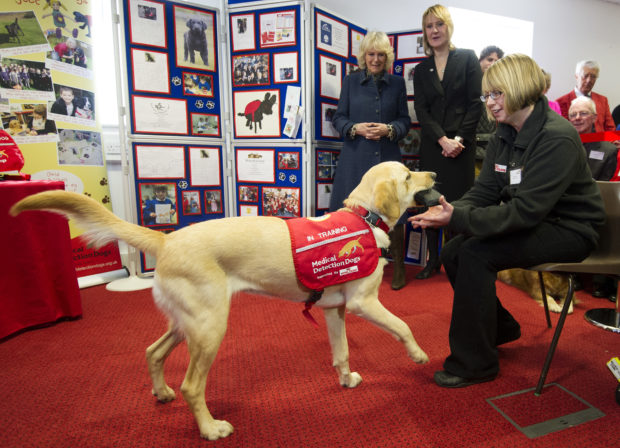Dogs being trained to sniff out COVID-19
LONDON, United Kingdom – A British charity has teamed up with scientists to see whether dogs could help detect COVID-19 through their keen sense of smell, they said on Friday.

(FILES) In this file photo taken on February 20, 2013 Britain’s Camilla, Duchess of Cornwall (C), watches a display by a working dog as she visits Medical Detection Dogs (MDD) charity in Great Horwood, outside Milton Keynes, north of London. – A British charity has teamed up with scientists to see whether dogs could help detect COVID-19 through their keen sense of smell, they said on Friday, March 27. (Photo by CARL COURT / POOL / AFP)
Medical Detection Dogs will work with the London School of Hygiene and Tropical Medicine (LSHTM) and Durham University in northeast England to determine whether canines could help diagnoses.
It follows previous research into dogs’ ability to sniff out malaria and is based on a belief that each disease triggers a distinct odour.
The organisations said they had begun preparations to train dogs in six weeks “to help provide a rapid, non-invasive diagnosis towards the tail end of the epidemic”.
The charity has previously trained dogs to detect diseases such as cancer, Parkinson’s and bacterial infections by sniffing samples taken from patients.
They can also detect subtle changes in skin temperature, potentially making them useful to determining if a person has a fever.
Article continues after this advertisement“In principle, we’re sure that dogs could detect COVID-19,” said Claire Guest, founder and chief executive of Medical Detection Dogs.
Article continues after this advertisement“We are now looking into how we can safely catch the odour of the virus from patients and present it to the dogs.
“The aim is that dogs will be able to screen anyone, including those who are asymptomatic, and tell us whether they need to be tested.
“This would be fast, effective and non-invasive and make sure the limited NHS (National Health Service) testing resources are only used where they are really needed.”
The head of disease control at the LSHTM said dogs could detect malaria with “extremely high accuracy” and, as other respiratory diseases changed body odour, there was a “very high chance” it could also work with COVID-19.
Detection dogs could be deployed at airports at the end of the epidemic to rapidly identify people carrying the virus, helping prevent the re-emergence of the disease, according to Steve Lindsay from Durham University.
Over 500,000 coronavirus infections have now been recorded across 182 countries, contributing to 22,920 deaths, according to an AFP calculation based on official country data and World Health Organization figures.
The number of actual infections is believed to be higher since many countries are only testing severe cases or patients requiring hospitalisation.
GSG
For more news about the novel coronavirus click here.
What you need to know about Coronavirus.
For more information on COVID-19, call the DOH Hotline: (02) 86517800 local 1149/1150.
The Inquirer Foundation supports our healthcare frontliners and is still accepting cash donations to be deposited at Banco de Oro (BDO) current account #007960018860 or donate through PayMaya using this link.